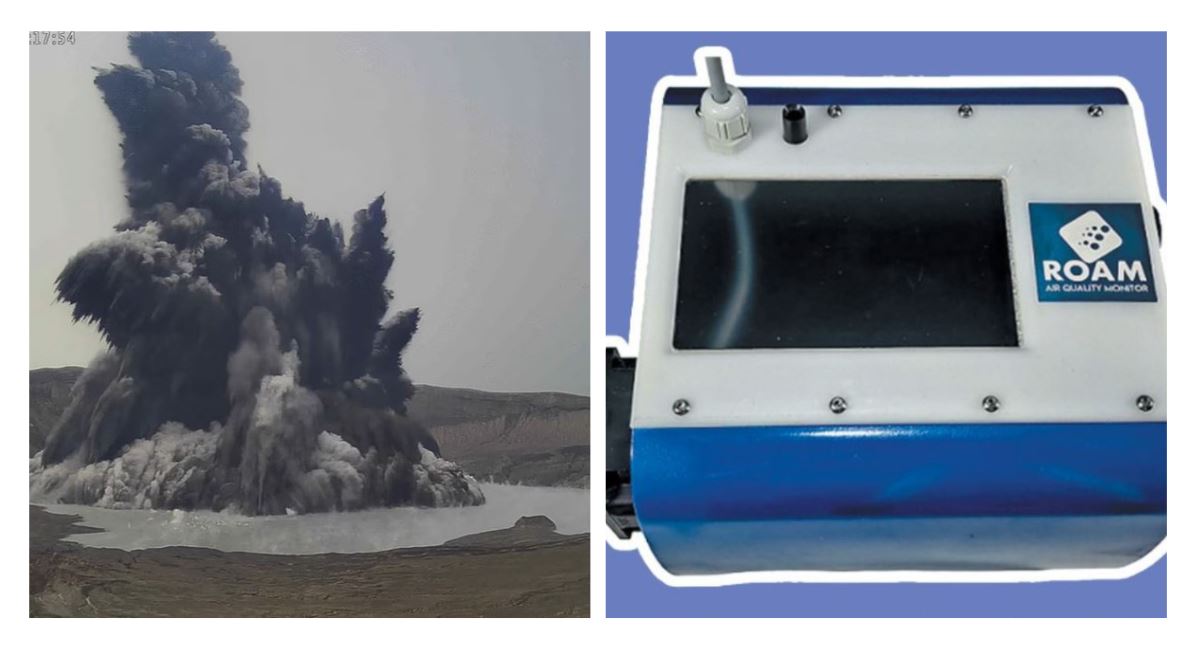
The Philippines’ first-ever low-cost, high-quality aerosol monitors developed by researchers from the University of the Philippines Diliman (UP Diliman) will be deployed in the provinces of Batangas and Cavite to help reduce air pollution in areas most affected by Taal Volcano’s unrest.
Taal Volcano in Batangas province had a phreatomagmatic eruption on July 1, 2021, after continued unrest since its last major eruption on January 12, 2020, 43 years after its eruption in 1977. Alert Level 3 (Magmatic Unrest) now prevails over Taal Volcano with the possibility of an explosive eruption.
Taal Volcano’s immediate vicinity covers the municipalities of Agoncillo in Batangas and Tagaytay and Alfonso in Cavite where the Robust Optical Aerosol Monitor (ROAM) air quality monitoring units will be installed.
Spearheaded by Dr. Len Herald V. Lim, Project ROAM was initiated by UP researchers in partnership with the Department of Science and Technology – Philippine Council for Industry, Energy and Emerging Technology Research and Development (DOST-PCIEERD).
The Filipino-made air quality monitors measure particulate matter concentration in the air using mass concentration measurement. They are specifically designed to minimize the effects of air pollution in communities and workplaces.

According to Levi Guillermo L. Geganzo of Project ROAM, plans to deploy the units to the three local government units (LGUs) in Batangas and Cavite are currently being discussed. Researchers are also in talks with the Philippine Institute of Volcanology and Seismology (PHIVOLCS) to help them with their regular monitoring.
“Currently, ROAM is exploring the creation of a spin-off company through DOST-PCIEERD’s Funding Assistance for Spinoff and Translation of Research in Advancing Commercialization (FASTRAC) program to help advance the commercialization of their technology,” the DOST-PCIEERD reported on July 12, 2021.
DOST-PCIEERD Executive Director Dr. Enrico Paringit lauded the move of the group and encouraged other local government units to partner with ROAM in putting up air quality monitors in their area.
“We thank the Project ROAM team for heeding the call of the times and making innovations work for the people,” Dr. Enrico Paringit said in a statement.
“As a leader and partner in enabling innovations in the Philippines, we enjoin our local government units to collaborate with our researchers in finding solutions in making our air cleaner through technologies brought about by research and development,” Dr. Paringit added.
The University of the Philippines earlier allowed open access to its Light Detection and Ranging (LiDAR) portal on the Taal Volcano to help hasten rehabilitation efforts, marking the first time an Asian country has practiced such open data policy.
SEND CHEERS in the comments below to researchers from the University of the Philippines Diliman who have developed the Philippines’ first-ever low-cost, high-quality aerosol monitors that will soon be deployed in the provinces of Batangas and Cavite to help reduce air pollution in areas most affected by Taal Volcano’s unrest.
Good News Pilipinas is celebrating its 15th Anniversary in 2021 by giving away prizes! Subscribe to our Good News Pilipinas! TV YouTube channel and enter the raffle by sending us an email to editor@goodnewspilipinas.com
The post Philippines’ 1st air quality monitor developed by UP researchers deployed in Taal appeared first on Good News Pilipinas.

0 Comments